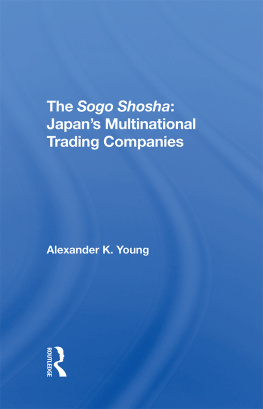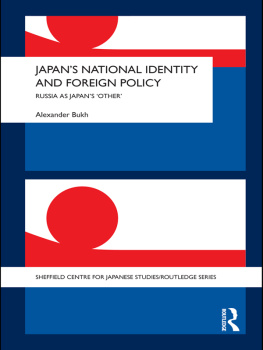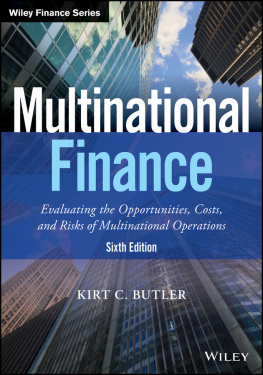The Sogo Shosha
Other Titles in This Series
Oil and Money and the World Economy, Yoon S. Park
Controlling Multinational Enterprises: Problems, Strategies, Counterstrategies, edited by Karl P. Sauvant and Farid G. Lavipour
The New International Economic Order, edited by Karl P. Sauvant and Hajo Hasenpflug
Foreign Investment and the Management of Political Risk, Dan Haendel
Internatio na l Business in the Middle East: Case Studies, Ashok Kapoor
Westview Special Studies in International Economics and Business
The Sogo Shosha: Japan's Multinational Trading Companies
Alexander K. Young
The sogo shosha, Japan's general trading companies, are regarded as a key element in the country's rapid economic growth after World War II and its great success in international trade. In Japanese fiscal year 1975, the ten largest sogo shosha had total sales of $155 billion, accounting for 56 percent of Japan's exports and imports, 18 percent of domestic wholesale trade, and 31 percent of GNP. On the international level, the transactions of these companies in the same year were 5 percent of world export trade.
This bookthe first comprehensive, English-language work on the sogo shosha systematically describes and analyzes the basic characteristics, business methods, sales and profit trends, strategies, national roles, global reach, strengths and weaknesses, and future prospects of these global trading conglomerates. In examining both the national and the global facets of the sogo shosha, the author presents the economic and social origins of the ten largest companies, how they differ from the pre-World War II zaibatsu, and how they resemble and differ from Western multinational corporations. A wealth of statistical and tabular material supplements his account of the sogo shosha as Japan's chief importers of foodstuffs, raw materials, and equipment; as the advance guard of Japanese exports; as a driving force to rationalize the domestic distribution system; and as investor-organizers of multinational overseas natural resource development programs.
Alexander K. Young is professor of international relations at the College of New Paltz, State University of New York, A graduate of the College of Law of the National Taiwan University, he received a Ph.D. from Columbia University, where he is currently an associate of the University Seminar on Modern Japan.
The Sogo Shosha : Japans Multinational Trading Companies
Alexander K. Young
First published 1979 by Westview Press, Inc.
Published 2019 by Routledge
52 Vanderbilt Avenue, New York, NY 10017
2 Park Square, Milton Park, Abingdon, Oxon OX14 4RN
Routledge is an imprint of the Taylor & Francis Group, an informa business
Copyright 1979 Taylor & Francis
All rights reserved. No part of this book may be reprinted or reproduced or utilised in any form or by any electronic, mechanical, or other means, now known or hereafter invented, including photocopying and recording, or in any information storage or retrieval system, without permission in writing from the publishers.
Notice:
Product or corporate names may be trademarks or registered trademarks, and are used only for identification and explanation without intent to infringe.
Library of Congress Cataloging in Publication Data
Young, Alexander K.
The sogo shosha.
(Westview special studies in international economics and business)
Bibliography: p.
1. Conglomerate corporationsJapan. 2. Export salesJapan. I. Title.
HD2756.J3Y68 338.880952 78-18935
ISBN 13: 978-0-367-29587-5 (hbk)
To the memory of my father, a good and just man
Former U.S. Secretary of Commerce Peter Peterson was correct when he referred to Japan's large general trading companies as "probably the world's most efficient marketing channel." These general trading companies, known as the sogo shosha, have played a key role in Japan's extraordinary economic growth since World War II and in its subsequent outstanding success as an international trader. As an indication of their scope, the ten largest sogo shosha had gross sales of $155 billion in the Japanese fiscal year that ended March 1976. This was 31 percent of Japan's gross national product. They handled about 56 percent of Japan's imports and exports and almost 20 percent of the total domestic wholesale trade in Japan. The export and overseas transactions of the sogo shosha in the same year amounted to slightly over 5 percent of total world export trade.
Despite their obvious significance in the japanese economic system and in world commerce, there is no other book-length objective study of the sogo shosha in English. The many studies in japanese of the sogo shosha are inaccessible to the English reader. Some also tend to be either ideologically based attacks or uninformative public relations defenses.
Perhaps the sheer size and complexity of the sogo shosha has prevented their adequate description and analysis. On the one hand, they are integral parts of Japanese society and culture, with historical roots extending as far back as the early 1870s, when their mission was to assist Japanrecently opened to the Western worldto industrialize and become politically independent. Their roles in the Japanese economy, always central, evolved and expanded during the first half of the twentieth century. During the period of economic recovery following World War II, the sogo shosha emerged as Japan's primary importers of food and raw materials, the advance guard of its export drive, modernizers of the incredibly complex Japanese domestic distribution system, and organizers-investors of huge natural resource development projects abroad.
On the other hand, the sogo shosha have always been externally orientedthey are, after all, trading companies. They have long had global networks for sales and communication. Responding to the challenges of the 1970s, they have chosen to become international enterprises, globally active in the trading of commodities, capital, technology, managerial skills, and labor. Today, the sogo shosha seem to be moving away from being solely an integral part of "Japan, Inc."that interlocking network of government, manufacturers, finance, and tradeand are becoming part of a more inclusive network of international trade and finance.
Individually and collectively, the sogo shosha are complex and evolving parts of one of the world's most productive economic systems. The goal of this book is to present the reader with an accurate description of what the general trading companies are, how they developed, and what the future is likely to hold for them.
The author has no ideological axe to grind for or against the sogo shosha. If this book has a thesis, it is simply that the japanese general trading companies warrant the close attention of businessmen, economists, government officials, and the educated public outside japan. As the second largest economy in the free world and as a vital and creative democratic society, japan is indisputably one of the most influential participants in the international community of nations. For too long have too many of its primary institutions remained shrouded from international attention. The Japanese sogo shosha are among the most significant phenomena of contemporary world commerce. The present volume aspires to describe them accurately and to place them in their appropriate contexts of Japanese society and international business.







